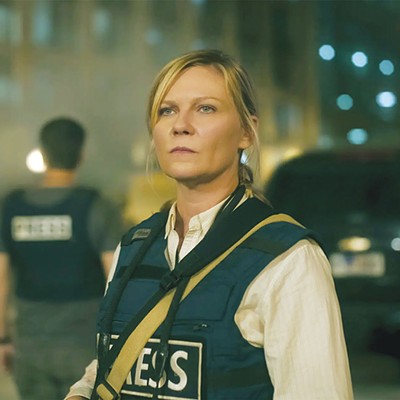The Messenger must have looked great on paper, good enough to attract an impressive cast including Woody Harrelson, Samantha Morton and Steve Buscemi who saw the potential of this previously untold story. The film, however, never gets off that paper, remaining as a series of annotations on this good idea. The scenes are held together sketchily with far too much in the margins. It could be a New Yorker article, but it never quite makes it on celluloid.
This is the debut of director Oren Moverman, who clearly takes his subject matter seriously. The initial scenes suggest Moverman has something to say - Woody Harrelson's Captain Tony Stone tells Sergeant Will Montgomery (Ben Foster) that they should broadcast every funeral of a soldier on live television. He toys with the mentality behind the "support the troops" bumper sticker culture for a while, then he gets lost in his own thoughts, unsure as to where to place the blame or responsibility. The scenes wander off like the notes in an ever-growing spider diagram of connections. The beginning is certain and the dialogue forceful, but it drifts and drifts, losing our interest. Stone and Montgomery meet the families of dead soldiers, absorb their emotions, get drunk, meet the families of more dead soldiers and so on.
The soldiers develop an unemotional routine that they present over and over. Stone has a number of rules to which Montgomery is supposed to adhere - no hugging, no cups of tea, no introductions - and which allow Stone to keep going. Their performances are executed precisely and cleanly. Yet it's the professional nature of their acting in conveying the professional nature of casualty notification that stiffens the entire movie and prevents this good idea from becoming good film. This is a movie depicting the impact of war at what ought to be its most emotional, relatable point - the time that relatives are told their loved one is dead.
We can't all relate to death by sniper fire, but we should be able to connect with losing our son, father or husband. Yet, this is an intellectual movie. It is cerebral, not emotional. Woody Harrelson and Ben Foster act the heck out of their parts, but convey nothing of the experience of these soldiers. They do what they can with what Moverman gave them, and he didn't give them enough. It's a film about having heart amid heartlessness, but nothing beats beneath the surface.
A good idea and good performances don't necessarily make for a good film-watching experience. This film does, however, plant a seed in the minds of the audience that might take root and grow once the credits roll. What is not in the movie might come about in the thoughts of the viewer. This is a novel idea, but one that could have packed a better punch.
The Messenger ★★★✩✩
Starring Ben Foster, Woody Harrelson, Samantha Morton . Directed by Oren Moverman. Written by Alessandro Camon, Oren Moverman. Rated R
{youtubejw}8MEApxjYncI{/youtubejw}


















